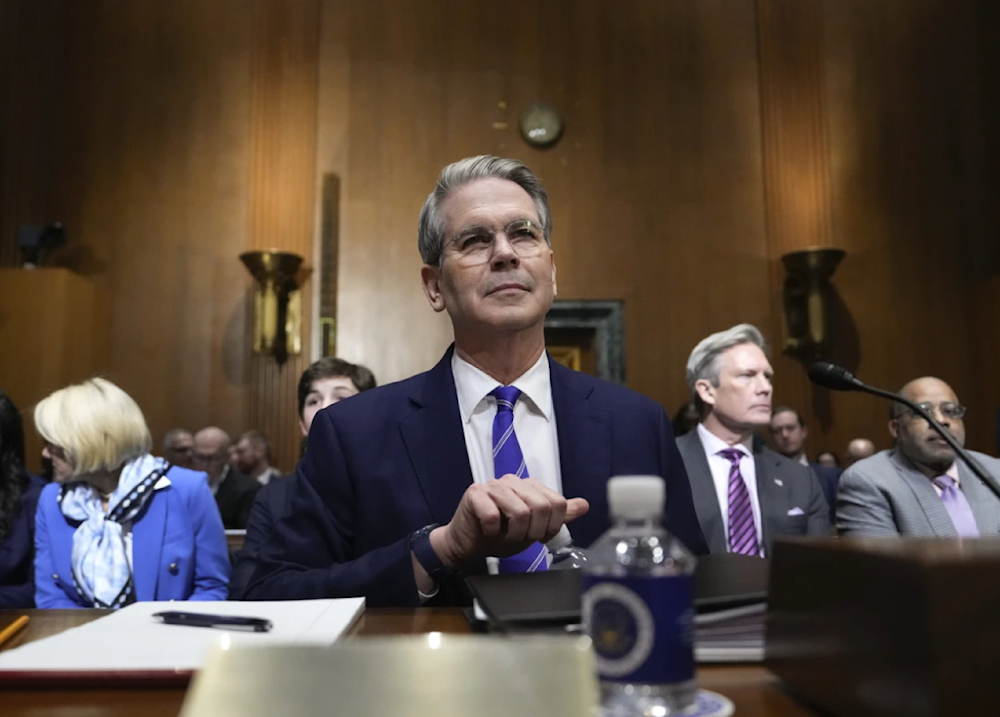US Treasury's Bessent to skip G20 meeting in South Africa
A source told Reuters that the G20 member countries had been advised of Bessent's intention not to attend.
-

Scott Bessent appears before the Senate Finance Committee for his confirmation hearing at the Capitol, in Washington, on January 16, 2025. (AP)
US Treasury Secretary Scott Bessent will not attend next week's meeting of finance ministers and central bank governors from the Group of 20 countries in Cape Town, South Africa, according to individuals familiar with his intentions.
Missing the regular gathering of finance chiefs from the world's top nations is rare for a US Treasury secretary, given that the US frequently leads G20 accords on financial and monetary policy issues.
One of the individuals told Reuters that G20 member countries had been informed of Bessent's intention not to attend. A spokesperson for the US Treasury did not respond to a request for comment on his plans.
The G20 finance group has addressed a wide variety of global economic concerns, including combatting inflation and climate change, as well as financial crises and trade tensions. South Africa holds the G20 chairmanship from December 2024 to November 2025.
Tensions between the United States and South Africa have increased in recent weeks, after concerns from US President Donald Trump about South Africa's land policy and its legal case against "Israel" at the International Court of Justice (ICJ).
Trump accused South Africa of land theft and treating certain people "very badly" earlier this month and signed an executive order halting financial assistance to the country.
US Secretary of State Marco Rubio subsequently canceled a trip to Johannesburg for a meeting of G20 foreign ministers on Thursday and Friday.
According to US government data, South Africa received nearly $440 million in financial assistance from Washington in 2023. The newly signed executive order cuts this funding, with the White House pointing to South Africa's land redistribution efforts and its ICJ case against "Israel" over the Gaza genocide as primary reasons for the move.
The White House also revealed plans to create a pathway for the resettlement of white South African farmers, known as Afrikaners, in the US through the country's refugee admissions program. A statement from US officials emphasized a focus on humanitarian relief for Afrikaners, describing them as "mostly white descendants of early Dutch and French settlers."
South Africa responds
South Africa's foreign ministry strongly criticized the executive order, calling it factually incorrect and dismissive of the country's history. "It lacks factual accuracy and fails to recognize South Africa's profound and painful history of colonialism and apartheid," a ministry statement said.
Government officials also condemned the refugee provision, stating, "It is ironic that the executive order makes provision for refugee status in the US for a group in South Africa that remains amongst the most economically privileged, while vulnerable people in the US from other parts of the world are being deported and denied asylum despite real hardship."
Land ownership remains a contentious issue in South Africa. Under colonial rule and apartheid, most farmland was allocated to white landowners. The 1950 law passed by the Afrikaner-led National Party further entrenched this system, with 85% of the land designated for white ownership, displacing millions of Black South Africans.
In 2023, President Cyril Ramaphosa signed a law aimed at facilitating state-led land expropriation in the public interest. He defended the policy, stating that the government had not confiscated any land but was working to address racial imbalances in land ownership. "We will not be bullied," Ramaphosa asserted.
The White House, however, cited the land reform policy as an example of South Africa treating "certain classes of people very badly." Trump has made similar claims before but has not provided evidence to support them. Elon Musk, the South African-born billionaire and a Trump ally, has also spoken out on the issue, saying that "white South Africans have been the victims of racist ownership laws."

 4 Min Read
4 Min Read








